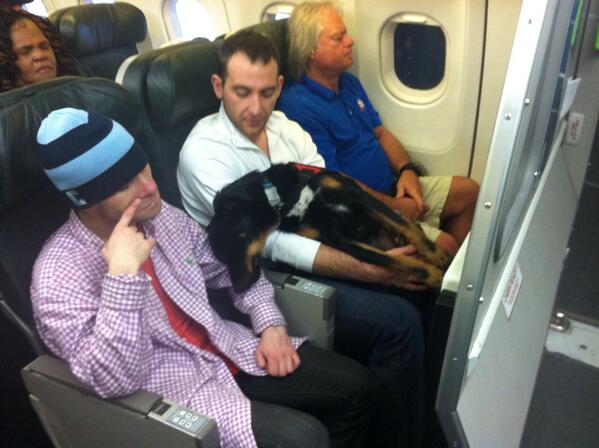Absent Social Conscience
"We receive calls from transit, public libraries, restaurants, you name it, it's regular."
Doctors don't have the expertise to determine if that dog is of good enough behaviour to be out in public."
Laura Watamanuk, executive director, Pacific Assistance Dogs Society
"It's just seemed to explode. This is a very pet-oriented society ... so when people see a legitimate [service] dog they think, 'Well why not my dog?' But they don't realize the ramifications."
Lynn Raloff, head, Guide Dog Users of Canada

imgur.com This is likely one of those fake guide dogs.
It's human nature, it seems, to be resentful of what some view as special privileges extended to some within society, but not others. That the some to whom special privileges are extended are usually people who require those courtesies -- like parking for the handicapped, and permitting especially trained guide dogs entry with the people they guide -- seems not to adequately penetrate the minds of those who park in those spots regardless, and in the instances of some dog owners, claim their pets are entitled to special 'guide-dog' treatment.
It's true, we love our dogs. Why wouldn't we? They love us, and we're impressed that they're so dependent on us. They trust us and they like being around us, so why wouldn't we do our utmost to reward them, have them around us all the time to bask in the feel-good aura of their adoration of their owners? There are some places where dogs are permitted everywhere; certainly more so in Europe than in North America where there are municipal by-laws preventing people from bringing pets into places where food is sold.
As a hygienic, precautionary measure, even though it's true that some dogs are cleaner than some people. As a general rule, humans believe that there is a place for companion animals and it isn't where people tend to congregate in places of commerce. Although we're animals just as they are, we don't threaten to bite others, we just threaten them in other, more human ways. Since there has to be certain limits of permissibility in polite society where a social contract is generally accepted, we obey laws that permit animals trained to guide the blind or the hearing-impaired entry where other pets' presence is forbidden.
Since where there's a will there's always a way, people in British Columbia -- and for all we know elsewhere as well -- have taken to portraying their pet companions as guide dogs, though they are not, to gain them entry and favoured status. But there have been more than ample complaints about this growing phenomenon and the province has decided to address the issue; no longer, without an official permit may people be allowed to bring their dogs into grocery stores and the cabins of airplanes.
A new provincial law has declared that faux service animals will no longer be permitted to make their presence where they clearly do not belong. The Guide Dog and Service Dog Act had its second reading in the B.C. legislature. And under its provisions guide-dog owners are to be given government issued identification, not unlike a driver's license. The current system which accepts cards issued by certified guide dog training facilities has been too long abused.
Doting dog owners have been dressing their dogs in service harnesses and present fraudulent identification which business owners are wary of challenging. Ms. Watamanuk in her capacity as executive director of the Pacific Assistance Dogs Society frequently fields calls by irate citizens reporting suspicious actions with "service dogs" constantly barking, or being placed on chairs in restaurants.
Sometimes doctors' notes accompany the uncertified dogs, but as she points out, authenticating a dog as a service animal is beyond the professional scope of a physician.

Facebook/Government of British Columbia This
service dog is the real thing. The Guide Dog & Service Dog Act
would provide the province's guide-dog owners with government-issued
identification, similar to a driver’s licence.
Lynn Raloff, herself blind, and as head of the Guide Dog Users of Canada's recently initiated fake service dog committee has her own Labrador Retriever guide dog to help her 'see'. She explains that the fake service dogs' actions are impacting on the positive views in the public of real service dogs. People are bringing their untrained dogs into public spaces sometimes prone to bad behaviour, even attacking legitimate working dogs.
One eBay seller of "certified service dog cards" has boasted "my dog flies on all major airlines with me at no charge, as well as stays in all the hotels with me at no charge". And at the Internet site FreeMyPaws.com, an ID card kit can be had for $70, and an official-appearing service dog cape can be bought for $20. What a changed world we live in; at one time such baldly illicit behaviour would have been looked upon by society with distaste.
Wonder if @9news or @denvernews wants to meet this guy at the gate? Fake service dog bugging other passengers.
Is it the rise of cutsie social media messages where images of "service dogs" are common, wearing pink cowboy hats, getting into fights with other dogs, defecating in the aisles of planes in flight and generally giving a bad name to the legitimate service dogs trained to behave entirely differently? These irresponsible pet owners appear to believe it is their right in a free society to disport themselves in whatever manner they wish.
Why would they not, when all too often celebrities flaunt their special status by bringing their dogs with them where lesser mortals would never dare, insisting that their pets are "emotional support dogs".
Labels: Animal Stories, Canada, Social Cultural Deviations



0 Comments:
Post a Comment
<< Home